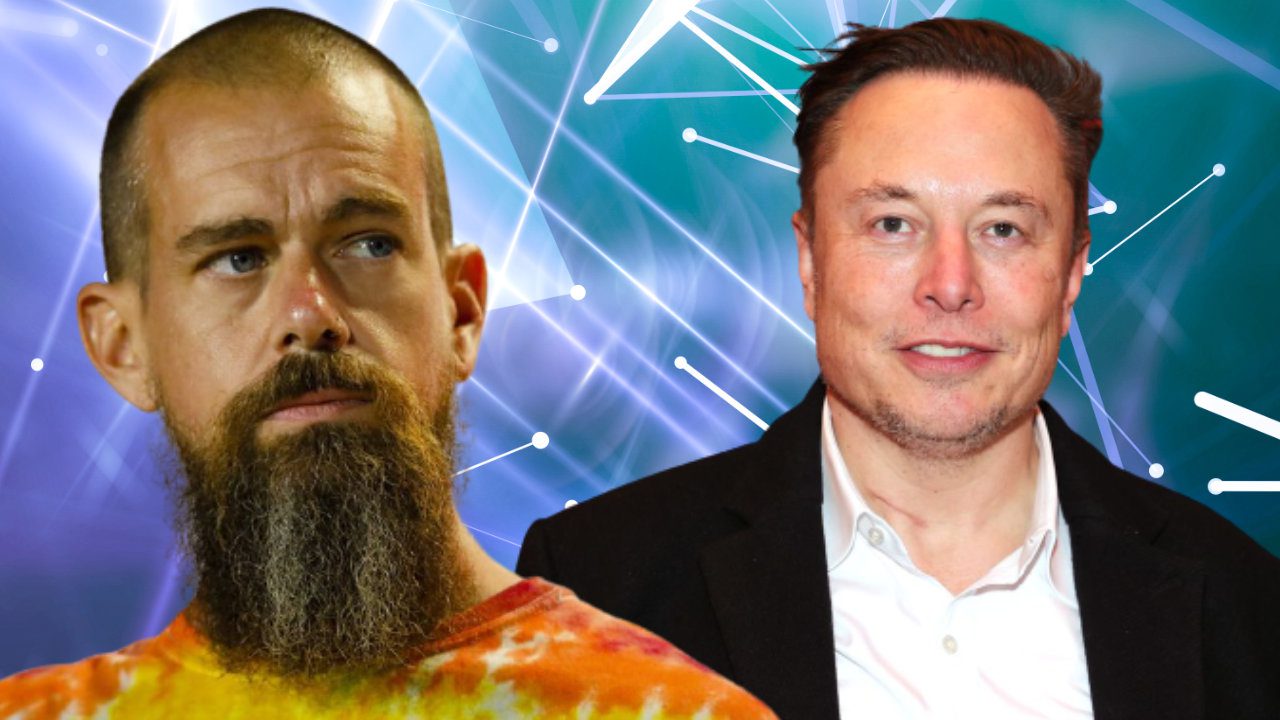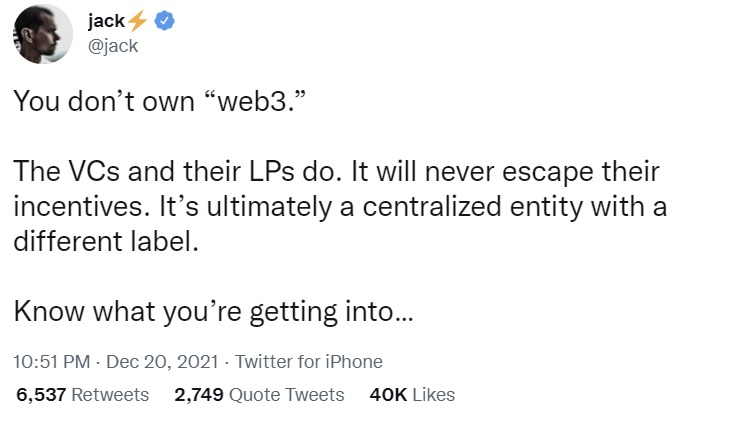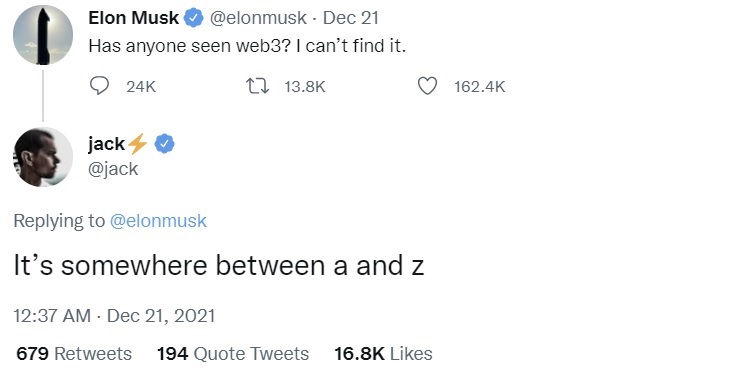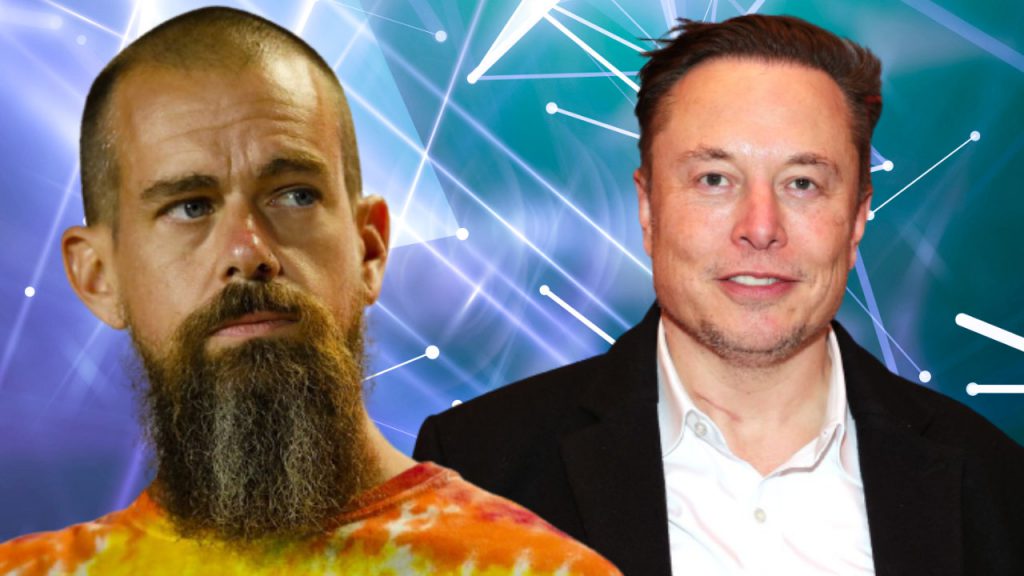
Former Twitter CEO Jack Dorsey has ignited a debate about web3 after Tesla CEO Elon Musk criticized it. Dorsey warned of the risks from centralization, emphasizing that web3 is owned by venture capitalists (VCs), hiding under the premise of decentralization. “I’m concerned to see ‘the industry’ be distracted under false pretenses when we could all be working on things that have a chance at fixing the real issues,” Dorsey wrote.
Jack Dorsey Says Web3 Is Owned by VCs, Tells Elon Musk ‘It’s Somewhere Between A and Z’
Jack Dorsey and Tesla CEO Elon Musk raised concerns about web3 this week. Dorsey warned Monday: “You don’t own ‘web3.’ The VCs and their LPs do. It will never escape their incentives. It’s ultimately a centralized entity with a different label. Know what you’re getting into.”

His comment followed Musk’s tweet a day prior stating that web3 “seems more marketing buzzword than reality right now.” The Tesla boss further tweeted, asking: “Has anyone seen web3? I can’t find it.” Dorsey replied: “It’s somewhere between a and z.”

While Dorsey did not specify which company he was referring to, many people on Twitter guessed that he was talking about venture capital firm Andreessen Horowitz (also known as A16z), which has been heavily pushing web3. “As the largest investor in the space, we know web3—but we also understand public service,” the A16z website states.
Some people shared Dorsey’s skepticism about venture capital firms. Cory Klippsten, founder of Swan Bitcoin, commented: “Jack knows exactly the massive scam A16z is perpetrating.” Another Twitter user described: “This tweet is referencing the shady crypto projects being funded by Silicon Valley juggernaut VC firm A16z (Andreessen Horowitz). They’re creating coins like solana and then using their endless capital to market them, explode in market caps then dump the coins on unsuspecting people.”
Web3 and Twitter
Balaji Srinivasan, a general partner at A16z who was the CTO of crypto exchange Coinbase, disagreed with Dorsey and brought up Twitter as an example. He wrote: “Twitter started as a protocol, the free speech wing of the free-speech party. Then corporate & political incentives led to deplatforming & censorship. Web3 offers the possibility, not guarantee, of something better.”
Dorsey replied: “All false. Twitter started as a corporation. It’s had corporate incentives from day 1. It’s trying to offset those, and it will, through Bluesky.” He elaborated:
‘Web3’ has the same corporate incentives, but hides it under ‘decentralization.’ It’s literally a different cap table structure.
The former CEO of Twitter, who is still the CEO of Block Inc., formerly Square Inc., also clarified Tuesday that he has nothing to do with web3 and has never been interested in it despite some news articles suggesting otherwise. He tweeted: “I have nothing to do with ‘web3.’ WSJ and others need names and photos to generate clicks.”
Heated Debate Over Web3 Ensues
Many people chimed in on the discussion about web3 on Twitter in response to Dorsey’s tweets. Some agree with Dorsey, including Alex Thorn, head of Firmwide Research at Galaxy Digital, who tweeted:
Jack is right that many web3 projects have ownership issues.
Thorn continued: “This is very visible with newer L1 chains, whose supplies are much more centralized than those from the ICO era (let alone bitcoin). Hard to see how the supplies (& governance) of these coins decentralize over time.”
Alexander Leishman, CEO of River Financial, wrote: “Jack gets it. Web3 will keep making people a lot of $$, but don’t delude yourself.”
However, some people disagree with Dorsey to some extent. The founders of the crypto exchange Gemini, the Winklevoss twins, joined the conversation. Tyler Winklevoss pointed out that Dorsey sold his first-ever tweet as a non-fungible token (NFT) for over $2.9 million. “Brought to you by web3,” he wrote. His brother, Cameron Winklevoss, noted:
If web2 could give you ownership of your data and privacy, web2 would have given you ownership of your data and privacy. Web3 at least has a chance.
Chris Dixon, a partner at A16z, argued: “In web3, all the code, data, and ownership is open source. Read it and decide for yourself. VCs (including A16z) own very little of it.”
‘I’m Concerned to See the Industry Be Distracted Under False Pretenses’
Dorsey explained in a different tweet: “I’m concerned to see ‘the industry’ be distracted under false pretenses when we could all be working on things that have a chance at fixing the real issues.” He emphasized that “The VCs are the problem,” and “not the people.”
Ajit Tripathi, CFA and head of institutional business at Aave, commented:
Jack is pointing out a risk we should acknowledge. It may not be what we want to hear but the risk of economic centralization of prime web3 properties is very real.
Dorsey responded with “Exactly.”
According to Dorsey, he was subsequently blocked on Twitter by Marc Andreessen, co-founder of Andreessen Horowitz, who is now a huge investor in web3 startups. The former Twitter boss wrote:
I’m officially banned from web3.
Do you agree with Jack Dorsey and Elon Musk about web3? Let us know in the comments section below.
Image Credits: Shutterstock, Pixabay, Wiki Commons
Disclaimer: This article is for informational purposes only. It is not a direct offer or solicitation of an offer to buy or sell, or a recommendation or endorsement of any products, services, or companies. Bitcoin.com does not provide investment, tax, legal, or accounting advice. Neither the company nor the author is responsible, directly or indirectly, for any damage or loss caused or alleged to be caused by or in connection with the use of or reliance on any content, goods or services mentioned in this article.
Read disclaimer


